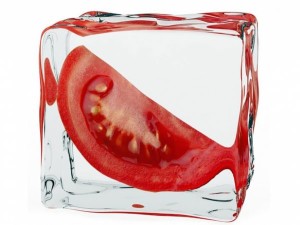Frozen foods are popular as practical fix for dinner with the working couples. Combating their rush hours all day long, when get home and peep into the fridge just find nothing to gulp, will inevitably gulp down frozen vegetables or frozen products. Of course, they are instant, convenient and affordable, but the bet is to choose a healthy, tasty and satisfying grab.
But are these rescues indeed nutritious and healthy? Can you really afford to have them all the time? What are the advantages and disadvantages of refrigeration food preservation? Well, I suggest you to dive into this post to clear your concerns on frozen food disadvantages.

What’s good about freezing food?
The good part in freezing is that it deactivates the bacteria though not kill them. It diminishes the favorable conditions for the survival of bacteria; low temperature and dry conditions make them dormant. Defrosting causes bacteria to multiply, i.e.; warmer temperatures activate bacteria. That is why it is suggested to defrost food slowly, preferably, overnight in the fridge to prevent the risk of bacterial growth in the food. The food starts to deteriorate as the fresh, once defrosted.
What’s not good about frozen meals?
The freezing process in frozen foods render the food less tasty, to compensate which they are processed with extra salt and fat, adding to the disadvantages of freezing food. Further, to stabilize the product, unhealthy vegetable oil is used as a preservative.
The high sodium content and the saturated fats form the major concerns that leave people exposed to higher risk of heart diseases and further worsen the conditions in the existing.
Consumer should read the “nutrition facts” on the package to get to the healthier choices since they vary from brand to brand. Also, there are many foods that are known to be diet friendly, but are not really healthy. So, be careful in picking the right product for yourself.
Check out the following to give Frozen Foods a Healthy twist:
Frozen meals may not be as nutritious as freshly cooked food, but you can take these pointers to make them healthy to some extent. Always follow the food storage guidelines for safe food storage.The advantages and disadvantages of refrigeration food preservation.
- When buying frozen foods, avoid one that come with any sauce because many of them tend to be cheesy and creamy, bearing high amounts of calories and fats. Once you thaw the box, do not refreeze it again. If it’s a package, take out the required amount quickly and refreeze the remaining. So, frozen food packaging is retained.
- Usually, ready-made meals do come in larger servings than required. So, choose the amount of about 250g per serving.
- Balance your meals with an appropriate serving of fruits or vegetables or If not, have a fresh fruit either before or after a meal. Doing so will enhance satiety and the nutritional aspect as well.
- Go for meals that include whole grains, vegetables and lean meat or fish for a low-calorie, nutrient-rich grab.
- Buy frozen fruits packed in its juices instead of those that come floating in added sugar syrup.
What are the good purchases of frozen foods?
The good purchases for frozen foods are fruits and vegetables. Firstly, they make the seasonal fruits and vegetables affordable even when they are out of the season, thus help provide nutrients year-around.
Secondly, shooting your nutritional concerns, fruits and vegetables when frozen, are processed and packed at their peak ripeness, which may cause negligible loss of nutrients. However, it retains most of the nutrients until defrosted, which need to be just before they are eaten.
Moreover, preserving the fruits and vegetables in refrigerators for a long period degrades the nutritional value. So, purchasing them frozen and defrosting whenever required can be a great way to retain nutrients. The kind of frozen food storage you are going for should be kept in mind. In several cases, dry food storage is a good option.
Why is it not safe to refreeze thawed (defrosted) food?
As mentioned above, food, when thawed, renders ideal for rapid bacterial multiplication. When this food is refrozen and defrosted later, it is likely to increase the count of bacteria causing food poisoning.
There is no harm if defrosted food is cooked prior to refreezing.
Although disadvantages of freezing foods are not recommended on and on. Do restrict them to situations of utmost necessary. On the other hand, canned and frozen fruits and vegetables are nutritious picks unless they contain added salt, sugar and cheesy sauces frozen food disadvantages.
Finally, do maintain a healthy and well-balanced diet to stay fit, energetic and full of life.
If you feel this post informative, don’t forget to share it with your family and friends.

